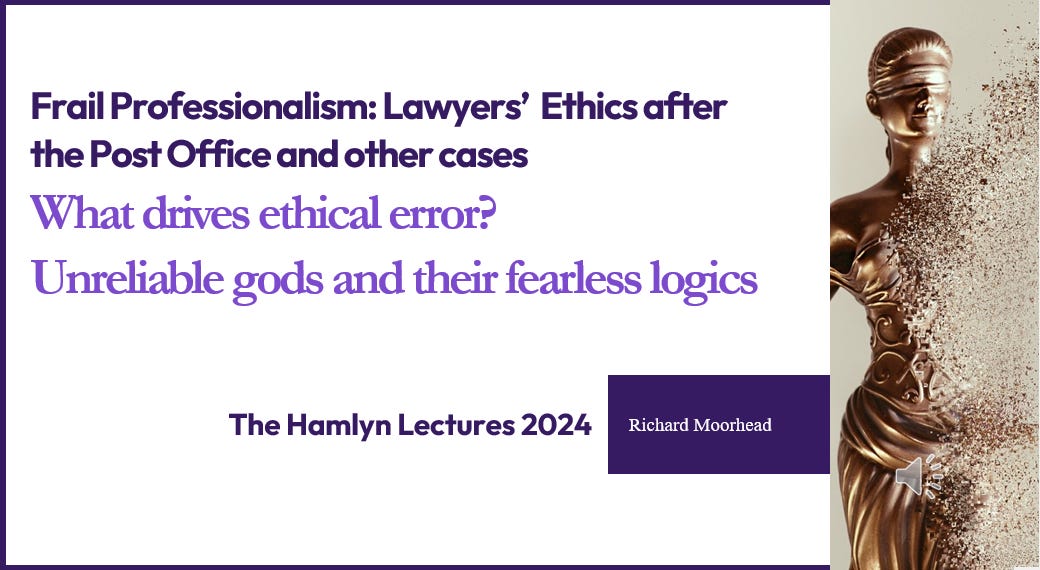What drives ethical failure? Unreliable gods and their fearless logics
The first of three Hamlyn lectures discusses lawyers ethics after the Post Office and other cases.
Last night I gave the first of three Hamlyn Lectures. You can watch a video recording on the Post Office Project’s video channel here.
A key part of the introduction says this:
The Post Office Scandal is emblematic of how ethical and system failure can lead to profound injustice. And I think it speaks to a significant problem of honesty and responsibility in political, commercial, and legal life.
That problem is encapsulated in broader concerns about a cover-up culture
but also a sense, amongst so many scandal victims, that there is one law for them
and another for the powerful: two-tier legality driven by, what I am going to define as, aggressive lawyering.I will argue that the Post Office but also other cases are emblematic of three things:
1. The first is the subject of tonight's lecture. How unreliable gods (self-regarding, unaccountable lawyers) with fearless logics are vulnerable to wrongdoing. How their logics spring from conventional but unbalanced ideas about professional partisanship. How those logics are structured by money, secrecy, and moral sophistry. How they are amplified by human frailties – psychological dispositions–
that magnify the chances of failure.2. The second lecture looks at how amoral, unreliable lawyering combines with unbalanced organisations. How irresponsible legal orthodoxies can drive cover-ups, “deliberate concealment”, “a lack of candour”, “the retelling of half-truths” and
the massaging of risk[1]3. The third will consider reform and suggest legal ethics is not solely a problem of individual lawyers, or unbalanced organisations, or legal and regulatory failure. Ethics is both an individual and a systemic problem requiring change in corporate governance, court practice, legal education, professional leadership, and better regulation.
[1] The definition is taken from Sir Brian Langstaff, ‘Infected Blood Inquiry, The Report: Overview and Recommendations, HC 569-I’ (2024) 189.





It has been said that every human action can be put down to the avoidance of shame - shame being the lowest human experience, akin to banishment from community, family, all belonging.
What gets lawyers into a position in which they face the risk of shame may be as simple as inadvertence, or laziness, or greed. However, once in a situation, the notion of being found to be wrong, or resiling from a position or course of action, or even admitting fault, triggers the more fundamental fear of shame.
My limited experience, for example, of dealing with solicitor and accountant negligence claims when acting for insurers showed how those involved simply could not admit fault and invariably preferred to fight with their clients and others than do so.
Lawyers are only human and I do not know of a solution to that condition. All we have is the idea that "the law is not to change the heart, but to restrain the heartless". The public, I suspect, believes that it is the work of regulators to keep lawyers faithful to the principles-based rules that govern their conduct. Some regulators, on the other hand, seem to be more concerned with promulgating regulations and steering clear of enforcement than doing the hard work of holding the regulated to account.
👏👏👏👏